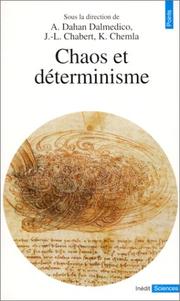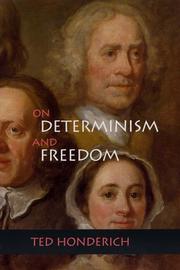| Listing 1 - 10 of 43 | << page >> |
Sort by
|
Book
ISBN: 9780801030857 Year: 2017 Publisher: Grand Rapids, Michigan : Baker Publishing Group,
Abstract | Keywords | Export | Availability | Bookmark
 Loading...
Loading...Choose an application
- Reference Manager
- EndNote
- RefWorks (Direct export to RefWorks)
The relationship between divine providence and human freedom remains one of the most vexing topics in Christian theology. Many gravitate to extreme ends of the spectrum, with a version of hyper-Calvinism on one end or perhaps some form of open theism on the other. Christian theology seems ever in search of a way to articulate a balanced picture of a sovereign God in relationship to humans who can make choices.This fresh study from an internationally respected scholar of the Reformation and post-Reformation eras shows how the Reformers and their successors analyzed and reconciled the concepts of divine sovereignty and human freedom. Richard Muller argues that traditional Reformed theology supported a robust theory of an omnipotent divine will and human free choice and drew on a tradition of Western theological and philosophical discussion that included such predecessor thinkers as Thomas Aquinas and Duns Scotus. In arguing this case, the book provides historical perspective on a topic of current interest and debate--the issue of freedom and determinism--and offers a corrective based on a broader analysis of the sources.
Book
Year: 1938 Publisher: Berlin : Verlag von Julius Springer,
Abstract | Keywords | Export | Availability | Bookmark
 Loading...
Loading...Choose an application
- Reference Manager
- EndNote
- RefWorks (Direct export to RefWorks)
Book
Year: 1913 Publisher: Berlin ; Leipzig : W. Rothschild,
Abstract | Keywords | Export | Availability | Bookmark
 Loading...
Loading...Choose an application
- Reference Manager
- EndNote
- RefWorks (Direct export to RefWorks)
Dissertation
Year: 1968 Publisher: Zurich : Juris Druck + Verlag,
Abstract | Keywords | Export | Availability | Bookmark
 Loading...
Loading...Choose an application
- Reference Manager
- EndNote
- RefWorks (Direct export to RefWorks)
Book
ISBN: 9782296011984 Year: 2006 Publisher: Paris : L'Harmattan,
Abstract | Keywords | Export | Availability | Bookmark
 Loading...
Loading...Choose an application
- Reference Manager
- EndNote
- RefWorks (Direct export to RefWorks)
Causalité --- Déterminisme (philosophie) --- Nécessité (philosophie) --- Causalité --- Déterminisme (philosophie) --- Nécessité (philosophie)
Book
ISBN: 9782749241845 2749241847 Year: 2014 Publisher: Ramonville-Saint-Agne : Erès,
Abstract | Keywords | Export | Availability | Bookmark
 Loading...
Loading...Choose an application
- Reference Manager
- EndNote
- RefWorks (Direct export to RefWorks)
Causalité. --- Déterminisme (philosophie) --- Interprétation (philosophie)
Book
ISBN: 9782919694778 Year: 2015 Publisher: Paris : Editions Matériologiques,
Abstract | Keywords | Export | Availability | Bookmark
 Loading...
Loading...Choose an application
- Reference Manager
- EndNote
- RefWorks (Direct export to RefWorks)
Individualité --- Individu (métaphysique) --- Déterminisme (philosophie) --- Recherche.
Book
ISBN: 9782493117090 Year: 2022 Publisher: Paris : Eliott éditions,
Abstract | Keywords | Export | Availability | Bookmark
 Loading...
Loading...Choose an application
- Reference Manager
- EndNote
- RefWorks (Direct export to RefWorks)
Les tueurs ont-ils un penchant inné pour le meurtre ? N'importe qui peut-il commettre un crime au gré des circonstances ? Inversement, certains individus sont-ils par nature des génies ? In fine, nos compétences langagière, perceptive, cognitive, sont-elles prédéterminées par notre ADN ? Notre conduite morale est-elle inscrite dans la nature humaine ? Sommes-nous destinés à être les individus que nous sommes ?? Et le comportement animal est-il, plus encore que le nôtre, biologiquement programmé ? Abordant tour à tour ces questions familières, Valentine Reynaud fait voler en éclats les distinctions du langage courant, traquant les différents préjugés associés à l'inné, notion commune dont l'usage est tiraillé entre idéologie et science, entre glorification de la singularité et acceptation de la diversité, entre prédétermination et ouverture au possible. Ce livre plaide pour une pratique éclairée du terme inné qui rende justice à la richesse des potentiels humains.
Inné (philosophie) --- Meurtriers. --- Déterminisme (philosophie) --- Prédestination.

ISBN: 2020151820 9782020151825 Year: 1992 Volume: S80 Publisher: Paris Seuil
Abstract | Keywords | Export | Availability | Bookmark
 Loading...
Loading...Choose an application
- Reference Manager
- EndNote
- RefWorks (Direct export to RefWorks)
Il est peu de domaines scientifiques qui n'aient succombé à la mode du chaos. De la biologie à la physique et à la cosmologie, les exemples sont multiples de systèmes dynamiques régis par des lois simples et déterministes- mais dont le comportement, dans certaines conditions, devient totalement imprédictible. Ce paradoxe apparent, signalé dès la fin du XIXe siècle par Henri Poincaré, fixe à la fois des limites au calcul et ouvre la voie à l'analyse du désordre, du hasard et de la complexité.

ISBN: 0748618414 9780748618415 Year: 2005 Publisher: Edinburgh : Edinburgh university press,
Abstract | Keywords | Export | Availability | Bookmark
 Loading...
Loading...Choose an application
- Reference Manager
- EndNote
- RefWorks (Direct export to RefWorks)
The most recalcitrant problem of philosophy, free will, laid out and taken beyond unsatisfactory standard solutions by Britain's foremost working philosopher.
| Listing 1 - 10 of 43 | << page >> |
Sort by
|

 Search
Search Feedback
Feedback About UniCat
About UniCat  Help
Help News
News